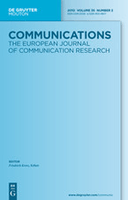
Communications-European Journal of Communication Research
Scope & Guideline
Elevating Discourse in the Field of Communication
Introduction
Aims and Scopes
- Interdisciplinary Approaches to Communication Research:
The journal adopts interdisciplinary methodologies, drawing from sociology, political science, media studies, and cultural studies to address complex communication phenomena. - Focus on Digital Communication and Social Media:
A significant emphasis is placed on understanding communication in the digital age, including the implications of social media, online hate speech, and digital disinformation. - Crisis Communication and Public Health:
Research exploring communication strategies during crises, particularly in public health contexts such as the COVID-19 pandemic, is a core focus area. - Media Representation and Identity:
The journal investigates how media represents various identities and groups, including issues of race, gender, and sexuality, and the impact of these representations on public perception. - Civic Engagement and Political Communication:
There is a consistent focus on how communication practices influence civic engagement, political participation, and public discourse in contemporary society. - Research on Media Ethics and Accountability:
The journal emphasizes the ethical implications of media practices, including accountability in journalism and the role of media in shaping public trust.
Trending and Emerging
- Online Hate Speech and Disinformation:
There is a growing body of research dedicated to understanding online hate speech and disinformation, particularly in the context of political discourse and public health crises. - Science Communication and Public Perception:
Emerging studies focus on how the public perceives science communication, especially during crises like the COVID-19 pandemic, highlighting pathways to knowledge and trust. - Digital Activism and Social Movements:
The journal is increasingly publishing works on digital activism, examining how social media platforms facilitate movements for social justice and political change. - Health Communication in Crisis Contexts:
Research on health communication strategies during crises has gained traction, exploring how information dissemination impacts public health outcomes. - Interdisciplinary Research on Media and Society:
An emerging trend is the intersection of media studies with other disciplines such as sociology, psychology, and economics, reflecting a holistic approach to understanding communication. - Impact of Technology on Communication Practices:
Recent publications are increasingly investigating the implications of new technologies, such as AI and data-driven communication, on societal engagement and media practices.
Declining or Waning
- Traditional Media Studies:
There has been a noticeable decrease in studies focused solely on traditional media forms, as the shift towards digital communication takes precedence. - Focus on Localized Issues:
Research centered on localized or specific regional issues appears to be waning, with a greater emphasis on global and transnational communication contexts. - Theoretical Frameworks from Previous Eras:
Older theoretical frameworks, such as those rooted in classical communication theories, are being overshadowed by newer models that address contemporary digital challenges. - Static Media Consumption Patterns:
There seems to be a decline in research examining static or conventional media consumption patterns, as scholars increasingly focus on the fluidity of media use in digital environments.
Similar Journals
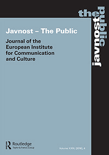
JAVNOST-THE PUBLIC
Connecting Research with Public ImpactJAVNOST - THE PUBLIC is a prestigious academic journal that has established itself as a leading platform within the field of communication. Published by Routledge Journals, Taylor & Francis Ltd in the United Kingdom, this journal caters to researchers, professionals, and students interested in the multifaceted dynamics of public communication and societal engagement. With an impressive Q1 ranking in the Communication category as of 2023 and a Scopus ranking of #166/511, placing it in the 67th percentile, it is widely recognized for its rigorous research contributions and theoretical insights. The journal has been in continuous circulation since its inception in 1994, and it actively seeks to publish high-quality, empirical studies that explore the nuances of public discourse, media influence, and societal interactions. Though a traditional publication, JAVNOST - THE PUBLIC remains committed to advancing the field by offering valuable resources and knowledge crucial for addressing contemporary challenges in public communication.
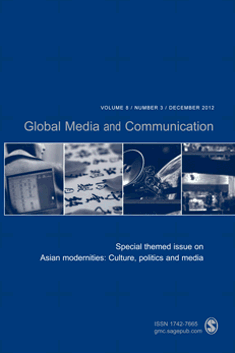
Global Media and Communication
Illuminating the Complex Ties Between Media and CultureGlobal Media and Communication is a premier journal dedicated to advancing the fields of media and communication studies, published by SAGE Publications Ltd. With an ISSN of 1742-7665 and an E-ISSN of 1742-7673, this journal offers a platform for scholarly discourse and innovative research that explores the intricate relationships between global media practices and communication strategies. Recognized as a Q1 journal in both the Arts and Humanities (Miscellaneous) and Communication categories for 2023, it stands out in its commitment to delivering high-quality, peer-reviewed articles that contribute to the understanding of contemporary media landscapes. Located in London, United Kingdom, the journal benefits from being at the heart of cultural and digital innovation. Researchers, professionals, and students can look forward to insightful articles that not only critique existing frameworks but also propose new methodologies, ensuring that Global Media and Communication remains a vital resource for anyone interested in navigating the evolving dynamics of media and communication on a global scale.

Revista Comunicacao Midiatica
Unveiling Insights into Media's Impact on SocietyRevista Comunicação Midiática is a prominent academic journal focusing on the fields of communication, media studies, and cultural dynamics, published by Universidade Estadual Paulista Júlio Mesquita Filho, Facility of Architecture, Arts & Communication. With its ISSN 2236-8000, this journal aims to disseminate innovative research, theoretical advancements, and practical insights that contribute to a deeper understanding of communication processes in contemporary society. Although it currently does not provide Open Access options, the journal serves as a valuable resource for researchers, professionals, and students who are keen to explore the intricate relationships between media and culture. Located in Bauru, Brazil, the journal is committed to fostering multidisciplinary dialogue and enhancing scholarly discourse, making it an invaluable addition to the academic landscape in the realm of media studies.

Tijdschrift voor Communicatiewetenschap
Exploring the Dynamics of Communication ScienceTijdschrift voor Communicatiewetenschap is a prominent academic journal published by Amsterdam University Press, specializing in the dynamic field of communication studies. With an ISSN of 1384-6930 and an E-ISSN of 1875-7286, this journal plays a vital role in disseminating high-quality research, theoretical advancements, and practical insights related to communication theory and practice. Despite its Q3 rank in the Communication category, it serves as a crucial platform for scholars and practitioners, striving to bridge gaps in knowledge and promote interdisciplinary dialogue. The journal's impact is reflected in its lineage of contributions from leading authors in the field. While the journal is not openly accessible, its curated content remains invaluable for researchers, professionals, and students eager to stay at the forefront of communication scholarship. With publications spanning from 2008 to 2024, 'Tijdschrift voor Communicatiewetenschap' continues to foster the development of communication sciences from its base in Amsterdam, Netherlands.
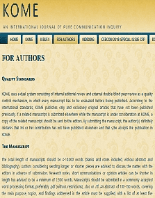
KOME-An International Journal of Pure Communication Inquiry
Engaging Minds, Transforming Communication UnderstandingKOME-An International Journal of Pure Communication Inquiry is a scholarly journal published by Ludovika University Press in Hungary, dedicated to advancing the study and understanding of communication across various contexts. Since its inception in 2012 as an open-access journal, KOME aims to foster a vibrant dialogue among researchers, professionals, and students by providing a platform for innovative research in the fields of Communication and Linguistics. With its recent classification as a Q3 journal in Communication and Q2 in Linguistics and Language, KOME stands out as a valuable resource, ranking in the 70th percentile for Linguistics and Language and 47th percentile for Communication in Scopus. Researchers are encouraged to submit original articles, reviews, and case studies that contribute to the evolving discourse on pure communication inquiries. Located at Ludovika ter 2, Budapest, this journal not only promotes academic excellence but also ensures that scholarly works are accessible to a global audience, reinforcing the importance of communication studies in our interconnected world.
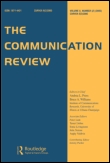
COMMUNICATION REVIEW
Unveiling New Perspectives in Communication StudiesCOMMUNICATION REVIEW is a premier journal dedicated to the dynamic and multifaceted field of communication, published by Routledge Journals, Taylor & Francis Ltd. With both ISSN 1071-4421 and E-ISSN 1547-7487, this journal has established itself as a vital resource for researchers, professionals, and students interested in innovative theories, cutting-edge research, and critical analyses within the field. Boasting a respected Q1 quartile ranking in Communication for 2023, it operates within the top tier of its category, underscored by a strong Scopus rank of #119 out of 511, placing it in the 76th percentile among its peers. Although not an open-access publication, it provides essential insights and findings that contribute significantly to the academic discourse on communication, making it a crucial reference for anyone looking to deepen their understanding of the subject. Enthusiasts and scholars alike will find COMMUNICATION REVIEW an invaluable journal that encapsulates the evolution and breadth of communication studies throughout its publication years from 1995 to 2001 and from 2003 to 2024.
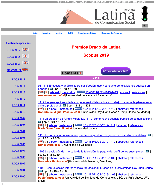
Revista Latina de Comunicacion Social
Connecting Scholars with Cutting-Edge ResearchRevista Latina de Comunicación Social is a prestigious and influential journal in the field of Communication, published by Historia Sistemas Informativos - HISIN. Established in 1998, this Open Access journal has continually contributed to the dissemination of high-quality research and innovative perspectives within the discipline. Based in Madrid, Spain, it has established itself as a vital platform for scholars, professionals, and students alike, particularly with its impressive ranking in the 2023 Scopus Ranks, where it sits at Rank #47 out of 511 journals in the Communication category, placing it in the 90th percentile. The journal embraces a broad scope that tracks the evolving trends and technologies in communication, with its Q1 status in Communication underlining its commitment to publishing impactful research. As it converges its years from 2011 to 2025, the journal remains dedicated to fostering academic discourse and engaging with emerging themes that shape the digital and traditional communication landscapes.

Media International Australia
Advancing Scholarly Dialogue in Media StudiesMedia International Australia is a leading journal that occupies a unique position at the intersection of communication and cultural studies. Published by SAGE Publications Ltd, this journal has established itself as a vital platform for scholarly discourse since its inception, now converging efforts from 2008 to 2024. With an impressive Q1 ranking in both the Communication and Cultural Studies categories, it ranks 12th out of 1304 in Cultural Studies and 42nd out of 511 in Communication, placing it within the 99th and 91st percentiles respectively according to Scopus metrics. The journal is committed to providing access to rigorous research that reflects contemporary issues in media, making it essential reading for researchers, professionals, and students keen on advancing their understanding of media's role in society. Despite not being fully Open Access, it ensures that quality research remains accessible through institutional subscriptions, allowing a broad audience to benefit from its insightful contributions.

Central European Journal of Communication
Connecting Scholars, Practitioners, and Ideas in CommunicationCentral European Journal of Communication, published by the Polish Communication Association, is a pivotal resource in the field of communication studies. Since its inception, this journal has become a significant platform for scholarly discourse, contributing valuable research and insights that span the diverse landscape of communication. With its current classification in the Q3 quartile of the communication category and a ranking of #315 out of 511 in Scopus, it is positioned to foster growth in communication research and practice within Central Europe and beyond. The journal invites submissions that explore a wide array of topics pertinent to communication, ensuring a robust dialogue among researchers, professionals, and students alike. Although currently operating under traditional access formats, the journal aims to enhance visibility and engagement by prioritizing quality content that addresses contemporary issues in communication, making it an essential resource for those looking to deepen their understanding of this dynamic field.

Tripodos
Unveiling Insights in Contemporary CommunicationTripodos is a prominent open-access journal published by UNIV RAMON LLULL, FAC CIENCIES COMUNICACIO BLANQUERNA in Spain, dedicated to advancing the field of communication studies since its establishment. With an ISSN of 1138-3305 and an E-ISSN of 2340-5007, Tripodos has gained recognition for publishing high-quality research articles that examine diverse aspects of communication in contemporary society. The journal has successfully transitioned to open access since 2006, ensuring that its valuable contributions are readily available to a global audience. As of 2023, Tripodos holds a Q3 ranking in the Communication category according to Scopus, reflecting its growing influence within the academic community, ranking 187 out of 511 journals and positioning itself in the 63rd percentile. This journal serves as an essential platform for researchers, professionals, and students who are eager to explore the dynamic field of communication and its impact on society.